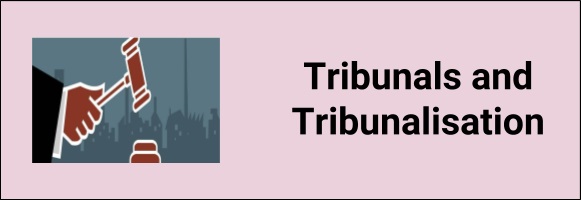(HOT) UPSC Current Affairs 2025 PDF
NEW! The Gist (NOV-2025) | E-BOOKS
Tribunals and Tribunalisation (Polity) : Important Topics for UPSC Exams

Tribunals and tribunalisation (Polity) : Important Topics for UPSC Exams
Tribunal is an administrative body established for the purpose of discharging quasi-judicial duties. Tribunals relieve the burden of judiciary and provide quick and speedy justice. It is to be noted that tribunals are not courts because courts follow the Courts are governed by strict procedure defined in CrPC, IPC and the Indian Evidence Act whereas tribunals are driven by the principles of natural justice.
Mandate (Constitutional provisions)
The provision for Tribunals was added by the 42nd Constitutional amendment act which added two new articles to the constitution.
1. Article 323-A : of the constitution which empowers the parliament to provide for the establishment of administrative tribunals for adjudicating the disputes relating to recruitment and conditions of service of a person appointed to public service of centre, states, local bodies, public corporations and other public authority. Accordingly parliament has enacted Administrative Tribunals Act,1985 which authorizes parliament to establish Centre and state Administrative tribunals (CAT & SATs).
A. Central Administrative Tribunal (CAT): It was set up in 1985 with the principal bench at Delhi and additional benches in other states ( It now has 17 benches, 15 operating at seats of HC’s and 2 in Lucknow and Jaipur.
-
It has original jurisdiction in matters related to recruitment and service of public servants (All India services, central services etc).
-
Its members have a status of High Court judges and are appointed by president.
-
Appeals against the order of CAT lie before the division of High Court after Supreme Court’s Chandra Kumar Judgement.
B. State administrative tribunals
-
Central government can establish state administrative tribunals on request of the state according to Administrative tribunals act of 1985
-
SAT’s enjoy original jurisdiction in relation to the matters of state government employees.
-
Chairman and members are appointed by President in consultation with the governor.
2. Article 323-B which empowers the parliament and the state legislatures to establish tribunals for adjudication of disputes related to following matters
• Taxation
• Foreign exchange, Imports and Exports
• Industry and Labour
• Land reforms
• Ceiling on Urban Property
• Elections to parliament and state legislature
• Food stuffs
• Rent and Tenancy Rights
Buy Printed Complete Study Materials for UPSC IAS PRELIMS Exam
Online Crash Course for UPSC PRE Exam
|
Note:
|
Issues with tribunalisation:
-
Appeal: Administrative tribunals were originally set up to provide specialized justice delivery and to reduce the burden of caseloads on regular courts. However, appeals from tribunals have inevitably managed to enter the mainstream judicial system.
-
High Pendency: Many tribunals also do not have adequate infrastructure to work smoothly and perform the functions originally envisioned leading to high pendency rates thus proving unfruitful to deliver quick justice.
-
Appointments: Appointments to tribunals are usually under the control of the executive. Not only does the government identify and appoint the members of the tribunals, but it also determines and makes appropriate staffing hires. This is problematic because often there is a lack of understanding of the staffing requirements in tribunals.
-
There is a lack of information available on the functioning of tribunals. Websites are routinely non-existent, unresponsive or not updated.
-
Accessibility is low due to scant geographic availability therefore justice becomes expensive and difficult.
-
Against the separation of powers: Tribunalisation is seen as encroachment of judicial branch by the government.
|
Note: Finance Bill 2017 aimed to streamline an increasingly unwieldy system of tribunals by winding up some existing tribunals and merging their functions into existing tribunals. These amendments also transfer to the central government the power to draft rules pertaining to the appointment, qualifications, terms of office and removal of the tribunal chairperson and members. |
Way Forward and solutions
-
Qualifications: In Union of India vs. R. Gandhi (2010), the Supreme Court looked at the working of tribunals closely. It said that when the existing jurisdiction of a court is transferred to a tribunal, its members should be persons of a rank, capacity and status as nearly as possible equal to the rank, status and capacity of the court.
-
Independence: The administrative support for all Tribunals should be from the Ministry of Law & Justice. Neither the Tribunals nor its members shall seek or be provided with facilities from the respective sponsoring or parent Ministries or concerned Department.
-
Accessibility: Tribunals must have benches in different parts so as to ensure that they are accessible.
-
Appointments to members: should be done by an impartial and independent selection committee.
MODEL QUESTIONS
:: MCQ’s ::
1. Provisions regarding tribunals were added by which Amendment act of constitution?
-
84th
-
44th
-
42nd
-
25th
Correct Answer : 42nd
2. Which of the following statements regarding Tribunals in India is/are correct?
-
Both Parliament and State legislatures have the powers to form tribunals under article 323-A of constitution.
-
Article 323-B provides for tribunals which can be formed by the states.
Which of the above is/are correct?
-
1 only
-
2 only
-
Both 1 and 2
-
None of the above
Correct Answer : b
3. Refer the following statements regarding administrative tribunals
-
President appoints the members of tribunals established by both the centre and states.
-
Appeals to the decision of these tribunals lie directly to the High Courts.
Which of the above is/are correct?
-
1 only
-
2 only
-
Both 1 and 2
-
None of the above
Correct Answer : a
4. Which of the following about Central Administrative Tribunal is correct?
-
It is a statutory body.
-
It was set up in 1985.
Which of the above is/are correct?
-
1 only
-
2 only
-
Both 1 and 2
-
None of the above.
Correct Answer : C
Civil Services Mains Examination

